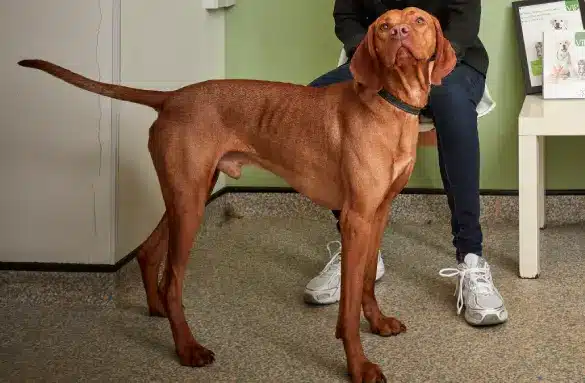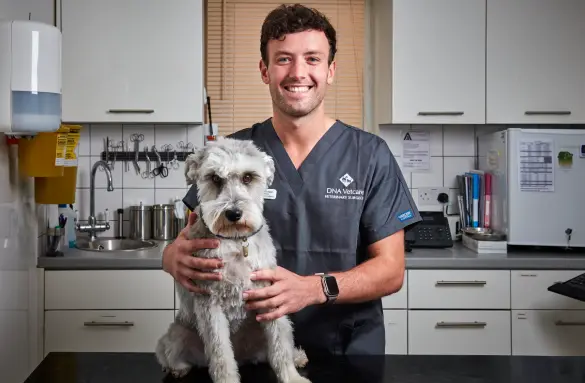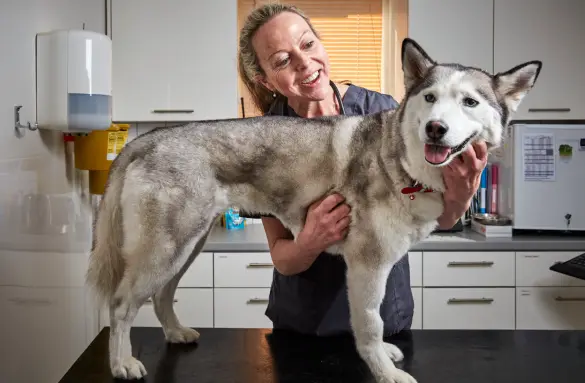At The Vet on Richmond Hill, we offer expert dog neutering services, a routine and highly effective surgical procedure, involving the removal of a dog’s reproductive organs.
We normally recommend neutering from 6 months of age. For male dogs, this is usually between 6–9 months depending on breed. For female dogs, neutering is typically advised at 6–7 months before their first season, or after their first season for larger breeds.
Whether you are in Richmond, Sheen, Hounslow, Brentford, Whitton, or Twickenham, our experienced team is here to provide the best care for your dog.

The Advantages of Dog Neutering
Getting your dog neutered can help prevent unwanted litters and provides health and behavioural benefits.
- Male dog neutering reduces the risk of testicular cancer and prostate diseases. It also helps with behavioural issues like aggression, roaming, and marking.
- Female dog neutering can prevent uterine infections (like pyometra) and lower the risk of mammary cancer. It may also result in improved mood and behaviour.
If your dog is due for spaying, it is preferable that they are treated for lungworm beforehand, as lungworm infection can cause problems with blood clotting during surgery.
What’s Involved in a Dog Neutering Procedure?
Pre-surgery
We provide a thorough health check to ensure your dog is fit for anesthesia. Your dedicated vet will also provide clear pre-surgery instructions for you to follow, such as fasting before the procedure.
Surgery
Your dog will be placed under general anesthesia, and our team will carefully monitor them throughout the process.
Male dogs (castration) – A small incision is made near the scrotum to remove the testicles, and the blood vessels and spermatic cords are tied off. The incision is then closed with dissolvable sutures or surgical glue.
Female dogs (spaying) – We offer traditional spaying or can provide keyhole spaying as a less invasive option.
Traditional spaying involves an incision to remove the ovaries and uterus.
Keyhole spaying involves making two or three small incisions in the abdomen. We can then insert a small camera (laparoscope), through one of the incisions to provide a clear view of the internal organs. Specialised surgical instruments are then used through the other incisions to remove the ovaries, and sometimes the uterus.
At Richmond Hill, we recommend keyhole spaying wherever possible for reduced infection risk, less post-operative pain, and faster recovery. You can read more on our dedicated Keyhole Spaying page for full details.
Post-surgery
We’ll monitor your dog as they recover from anesthesia and provide aftercare instructions so that they can make a smooth recovery.
For female dogs, spaying is usually an outpatient procedure, and your dog can typically go home the same day.
For male dogs, they will stay at the clinic for 1-2 hours for recovery before being sent home once stable.
Neutering Recovery for Dogs
We will provide prescribed pain relief medication and anti-inflammatories.
They will be required to wear an Elizabethan collar or a surgical suit so that it prevents them from licking the area of the incision.
We recommend that you limit your dog’s physical activity for a week to two weeks and keep an eye on the incision site to check for any signs of infection.
Our neutering aftercare instructions will also include feeding and hydration guidelines that you must follow for the first 24 hours.
Side Effects of Neutering a Dog
- Mild swelling / redness
- Drowsiness
- Loss of appetite (for the first 24-48 hours)
- Mild discomfort or sensitivity
- Slight weight gain due to hormonal changes
- Temporary coat texture changes
- Urinary incontinence

Rare Side Effects of Neutering a Dog
Regarding early spay and orthopaedic issues, we take this into account when discussing the most appropriate timing for your dog.
Other potential complications include excessive scar tissue formation, infection at the incision site, and hematomas, which are blood-filled swellings that can form around the surgical area.
Another possible complication, although uncommon, is the development of a spay incision hernia – when the tissue around the surgical site weakens, causing a bulge or protrusion at the incision point.
If you have any questions or concerns please don’t hesitate to contact us.
Costs of Neutering at The Vet on Richmond Hill
We offer competitive pricing for dog neutering services, with transparent costs.
For more information, check out our prices here.
Our VIP Health Plans offer long-term health benefits for your dog, including a discounted rate on neutering.
Why choose us?
Expert Care
We are a proudly independent, family-run practice offering veterinary excellence with experienced vets and nurses.
Advanced Techniques
Our clinic offers minimally invasive surgeries, including laparoscopic keyhole spaying for quicker recovery.
Community-Focused
Serving the Richmond community and surrounding areas, we ensure you don’t need to travel far for top-tier care.

Book your dog in to be neutered at our practice.
Our team is here to help you choose the right treatment and keep your pet safe.



